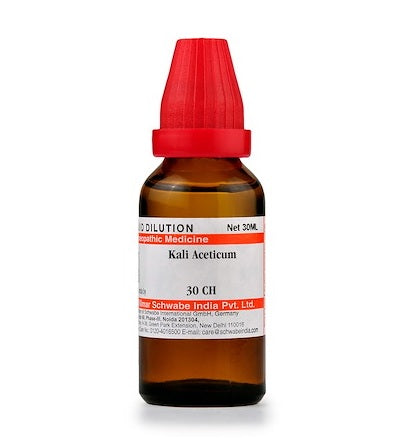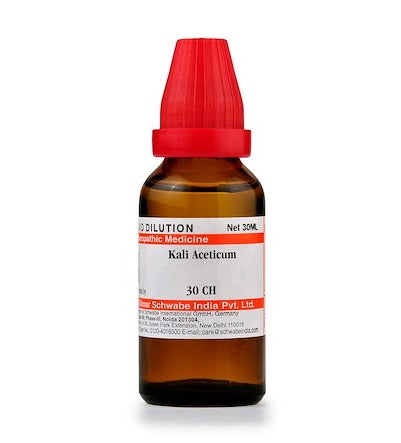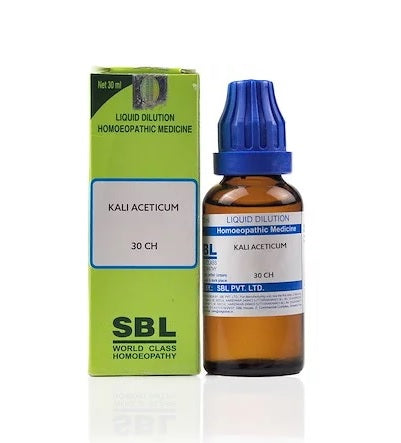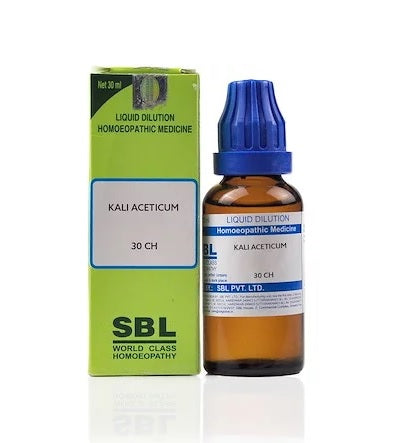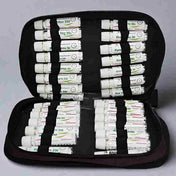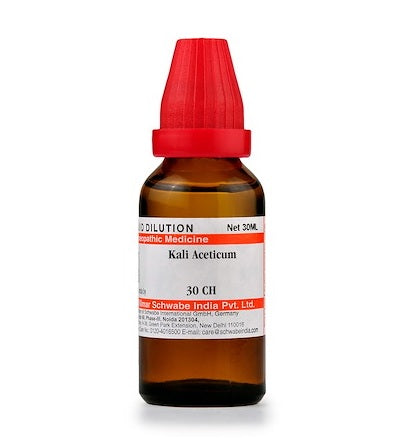Kali Aceticum Homeopathy Dilution 6C, 30C, 200C, 1M, 10M.
Kali Aceticum Homeopathy Dilution 6C, 30C, 200C, 1M, 10M. - Schwabe / 30 ML 6C is backordered and will ship as soon as it is back in stock.
Couldn't load pickup availability
Description
Description
About Kali Aceticum Homeopathy Dilution
Kali Aceticum, also known as Potassium Acetate, is a compound used in homeopathy. Here is a brief overview:
- Source: Kali Aceticum is a chemical compound made from potassium hydroxide and acetic acid. In its base form, it's a white, crystalline substance.
- Also Known As: It is scientifically known as Potassium Acetate and is represented by the chemical formula CH3CO2K. In homeopathic literature, it is referred to as Kali Aceticum, with "Kali" being a common homeopathic nomenclature for potassium.
- Clinical Indications: Kali Aceticum is used in homeopathy for a variety of conditions, particularly those involving fluid balance and urinary issues. It is indicated for cases of diabetes, where it is believed to help with the excessive urination and thirst associated with the condition. It may also be used for problems related to fluid retention and kidney function.
- Materia Medica Information: In the homeopathic materia medica, Kali Aceticum is described as a remedy for conditions characterized by weakness, debility, and malaise, often associated with excessive urination and thirst. It is also indicated for patients with symptoms of fluid retention and those suffering from kidney ailments.
- Side Effects: In homeopathic dilutions, Kali Aceticum is generally considered safe with minimal risk of side effects due to the highly diluted nature of homeopathic remedies. However, in its undiluted form, potassium acetate can be harmful if ingested in large quantities and can cause symptoms like gastrointestinal irritation, electrolyte imbalance, and in severe cases, cardiac issues.
Kali Aceticum Dilution is a homoeopathic medicine which is useful in treating various health related disorders such as diarrhoea and diabetes. It helps in treating severe pain in the abdomen accompanied with bleeding from the anus. Urinary disorders such as the increased flow of urine can also be treated by its use. Based on the homoeopathic formulation, it is safe to use.
Helpful in cases of diabetes and diarrhoea. Swelling all over the body. Griping pain in abdomen with diarrhœa and bleeding from the anus. Increasedflow of urine with weakness and trembling. Excessive sweating especially around the head.
Kali Aceticum Patient Profile
Head: Headache at 4 p.m. Sweating of the head especially between 11am to 1pm.
Abdomen: Dull pain in the abdomen with a sense of constriction. Painin umbilical region until has fallen asleep. Distension of abdomen after meals.
Stool: Bleeding from anus several times during the day. Diarrhoea. Has to go to stool twice in the evening.
Urinary Organs: Watery urine. Increased urine formation. Sweetish odour of urine.
Extremities: Weakness of limbs with headache. Trembling of limbs especially in the morning.
Generalities: Trembling of body with anxiety.
Fever: Sweat on head from 11am to 1 pm. Offensive perspiration.
Modalities: Generally worse in the morning, headache worse at 4 p.m.
Dosage: Please note that the dosage of single homoeopathic medicines varies from drug to drug depending upon the condition, age, sensitivity and other things. In some cases they are given as regular doses as 3-5 drops 2-3 times a day whereas in other cases they are given only once in a week, month or even in a longer period. We strongly recommend that the medication should be taken as per the physician's advice.
Kali Aceticum Homeopathy Dilution is available in SBL, Schwabe, Others (Homeomart, Hahnemann, Similia, Medisynth). When you choose 'Others' one of the 3 brands medicine will be sent subject to availability of these brands. All sealed units.
As with all homeopathic remedies, it's important to use Kali Aceticum under the guidance of a qualified homeopathic practitioner, especially when treating complex conditions. The effectiveness of homeopathic treatments can vary widely and is a subject of ongoing debate in the medical community.

